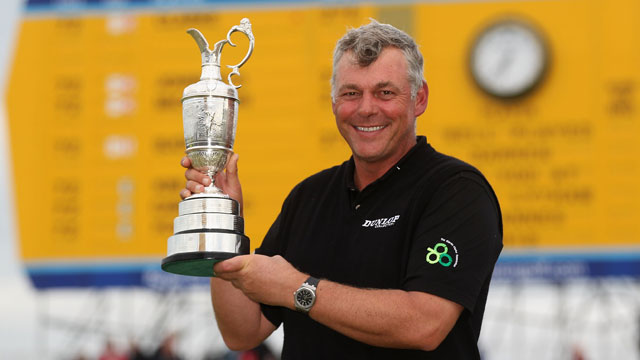NEWS
Clarke's Open triumph as poignant as it was impressive, says Malley

If the greatest sporting victories blend pure talent and relentless determination with high drama and tear-jerking emotion, then the award for the United Kingdom's Sportsman of the Year in 2011 should have gone to Darren Clarke.
Clarke's triumph at the Brtish Open at Royal St. George's had it all.
It saw the young guns of golf put in their place by a 42-year-old from Northern Ireland who could have been excused for believing his time was gone, yet who found his rightful position in major golfing history after more than 20 years and 54 attempts.
For any sportsman, such persistence -- Clarke had not made the top 10 of any major since he tied for third at the 2001 Open -- would have been impressive.
For Clarke, a star of so many Ryder Cup battles, it was a wondrous triumph and deserved reward for the dedication and mental strength he had demonstrated since his wife Heather died of cancer five years ago.
Importantly, this time Clarke knows any accolades he receives at the tail end of a sporting year are rooted in genuine talent and not driven by the sympathy vote as they were in 2006, when he was runner-up to Zara Phillips in the BBC Sports Personality of the Year poll after performing creditably when Europe defeated the United States in the Ryder Cup at the K Club just six weeks after his wife's death.
Even so, there were few more poignant sporting moments in 2011 than Clarke's victory speech at Sandwich.
"In terms of what's going through my heart, there's obviously somebody who is watching from up above there, and I know she'd be very proud of me," Clarke said as he clutched the famous Claret Jug. "But I think she'd be more proud of my two boys and them at home watching more than anything else. It's been a long journey to get here."
How proud, too, must Northern Ireland have been of Clarke, who captured golf's oldest major just weeks after fellow Irishman Rory McIlroy had lifted his first major at the U.S. Open by eight shots with a record score of 16 under par to become at 22 the youngest winner since Bobby Jones in 1923?
With Graeme McDowell having wom the U.S. Open in 2010, Clarke's victory meant Northern Ireland, a country of less than two million people, had three major winners in just 13 months. A phenomenal achievement.
But 2011 was a year that threw up some vintage British sporting feats.
None more gruelling than cyclist Mark Cavendish, who became the first British winner of the green jersey in the Tour de France after five stage victories and was also crowned road race world champion in Denmark. When it comes to sprinting, Cavendish, who goes about his business with a feisty attitude and ruthless efficiency, has no peer, and he took home the BBC Sportsman of the Year Award.
Let us hope the same can be said of Mo Farah when Britain's most exciting male athlete takes to the track in the 5,000 and 10,000 meter races at London 2012 next summer.
Farah's feats at the world championships in 2011, when he claimed silver in the 10,000 and gold in the shorter distance, with a searing last lap sprint, spoke of an athlete who is reaching his athletic peak with perfect timing.
The same might be said of 400 meter hurdles world champion, Welshman Dai Green, while England cricketers Andrew Strauss and Alastair Cook deserve a mention for their heroics in delivering the first Ashes series victory in Australia for 24 years.
There are more British sportsmen who excelled in 2011. Boxer Amir Khan, for one, who beat Zab Judah to unify the IBF and WBA Light Welterweight titles. Andy Murray, who reached No. 3 in the tennis world and reached the final of the Australian Open, for another.
But, for sheer tenacity and focus and conviction in his own talent, one man stood head and shoulders above the rest over the past 12 months. That man was Darren Clarke.
